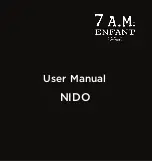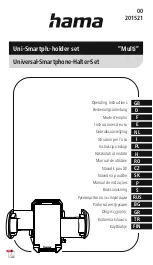
24
1 = .5x
6 = 64x
2 = 1x (sidereal)
7 = .5º / sec
3 = 4x
8 = 2º / sec
4 = 8x
9 = 3º / sec
5 = 16x
S
S
e
e
t
t
u
u
p
p
P
P
r
r
o
o
c
c
e
e
d
d
u
u
r
r
e
e
s
s
The Advanced GT contains many user defined setup functions designed to give the user control over the telescope's
many advanced features. All of the setup and utility features can be accessed by pressing the MENU key and
scrolling through the options:
Tracking Mode
This allows you to change the way the telescope tracks depending on the type of mount
being used to support the telescope. The telescope has three different tracking modes:
EQ North
Used
to track the sky when the telescope is polar aligned in the
Northern Hemisphere.
EQ South
Used to track the sky when the telescope is polar aligned in the
Southern Hemisphere.
Off
When using the telescope for terrestrial (land) observation, the
tracking can be turned off so that the telescope never moves.
Tracking Rate
In addition to being able to move the telescope with the hand control buttons, your
telescope will continually track a celestial object as it moves across the night sky. The
tracking rate can be changed depending on what type of object is being observed:
Sidereal
This rate compensates for the rotation of the Earth by moving the
telescope at the same rate as the rotation of the Earth, but in the
opposite direction. When the telescope is polar aligned, this can
be accomplished by moving the telescope in right ascension only.
Lunar
Used for tracking the moon when observing the lunar landscape.
Solar
Used for tracking the Sun when solar observing with the proper
filter.
View Time-Site
-
Displays the current time and longitude/latitude downloaded from the optional CN-16 GPS
receiver. It will also display other relevant time-site information like time zone, daylight saving and local sidereal
time. Local sidereal time (LST) is useful for knowing the right ascension of celestial objects that are located on the
Meridian at that time.
View Time-Site
will always display the last saved time and location entered while it is linking
with the GPS. Once current information has been received, it will update the displayed information. If GPS is
switched off or not present, the hand control will only display the last saved time and location.
User Defined Objects
- Your telescope can store up to 400 different user defined objects in its memory. The
objects can be daytime land objects or an interesting celestial object that you discover
that is not included in the regular database. There are several ways to save an object to
memory depending on what type of object it is:
Nine available slew speeds
















































